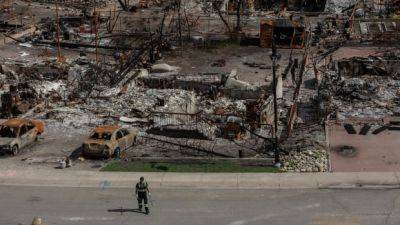Canada should slash carbon emissions by up to 55 per cent, says climate advisory body
A panel of experts advising the federal government on climate policy says Canada should at minimum cut its carbon emissions in half by 2035.
The Net Zero Advisory Body is calling on the government to amp up its ambitions and slash climate-cooking emissions by up to 55 per cent below 2005 levels by 2035.
The federal government's current goal is to cut emissions by up to 45 per cent by 2030.
The advice comes as the federal government prepares to set a new legally binding climate target for 2035 under the country's Net Zero Emission Accountability Act. The new target is expected to be released in December.
The advisory body said it considered setting targets as high as 60 per cent but settled on a range of 50 to 55 per cent.
In a report released today, the the Net Zero Advisory Body says that range would be technically and economically feasible.
The report also suggests that target would ensure Canada doesn't fall too far behind other major economies like the U.S., the European Union and the U.K.
The U.K.'s 2035 emissions reduction target is 74 per cent below 2005 levels.
The Net Zero Advisory Body says it developed its latest recommendation to reflect Canada's obligations under the landmark 2015 international Paris Agreement climate pact.
That agreement states countries must keep the increase in the planet's temperature to well below 2 C and work to limit it to 1.5 C above pre-industrial levels.
Although countries have made progress, the UN has said the world is still on track to surpass the limits outlined in the Paris Agreement, leading to more devastating flooding, heat waves and forest fires.
Some of those impacts could be avoided if countries limit pollution from burning fossil fuels.
The earth's atmosphere acts like a blanket.







